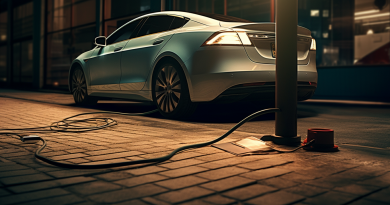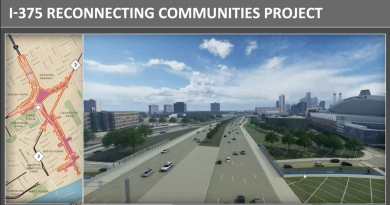Ford Loves New Mobility So Much, Their Exec Keeps Bragging About Driving His Truck To Buy A Cup Of Coffee.
On urbanist Twitter, controversies are usually relatively benign: someone asks if a pro-car commenter is lost, perhaps, or we have a disagreement over the degree to which Matt Yglesias is a terrible person. But one thing we generally don’t have to do, is go head-to-head with the spokesperson of a giant corporation as he ridicules robust bodies of academic and professional research that we all generally agree is important and pretty much true. Such was the case this week as Ford’s Mike Levine, Director of Product Communications for North America, decided to absolutely savage David Zipper, a visiting fellow at the Harvard Kennedy School. It’s not a good look for the Blue Oval, which is trying– and failing spectacularly- to differentiate itself as the cool dad.
Before we get into Maverickgate, let’s consider the landscape a bit: Ford has generally struggled to find strategic direction in the past few years since breaking profit records while claiming that it believes in things like decarbonization and mobility outside of simply selling trucks. (It’s not clear that it actually does believe in those things, which we’ll get to later). The high rates of profit are mostly owing to the increasing dominance of trucks and SUVs in the American market combined with a historic, protracted bull market that simply won’t die. If we parse that a bit, it’s not really that there’s no demand for smaller vehicles, it’s that most American automakers simply have stopped making them. Larger vehicles– like the F-series pickups- are far more profitable for the automakers for various reasons.
But Weight, There’s More: The Achilles Heel of Electric Vehicles
I’ve written about why the “trucks only” model is bad for business, and about how companies are desperately struggling to figure out market strategy or even pricing for new vehicles. David Zipper, on the other hand, is concerned with why this is bad for safety (something I’ve also written about). Keith Bradsher wrote about this in a since-forgotten 2002 book, which I read back-to-back with Angie Schmitt’s Right Of Way in 2021 during my thesis research. Schmitt’s book is more about pedestrian safety in general, but also discusses the threat of giant vehicles. There’s a lot of research on this subject, and we can summarize it by saying that huge, heavy vehicles are more likely to kill a pedestrian, cyclist, or passenger in another vehicle in an impact. It’s not just the weight. It’s also the height.

Zipper pointing this out is at face value a pretty reasonable thing, and I’ve often found myself reading pieces by him in The Atlantic or just giving him the old casual retweet or what have you. The truth of vehicles getting heavier is a tiny bit more complicated than just “Big Truck Good.” Automakers switched to advanced, lighter-weight alloys to meet the Obama-era CAFE standards in the 2010s. But cars have a lot more entertainment features, safety features, and electronics than they did twenty years ago, and this is more than offsetting that weight, while engines have gotten substantially more efficient. Our non-hybrid CRV, for example, can pull 40mpg at 45-60mph speeds, while my wife’s older, also non-hybrid Civic, was several hundred pounds lighter and still got worse fuel economy.
Twitter discourse over vehicle weight is where the conflict began. Mike started by disputing the very premise that the growing size and weight of vehicles meant that crashes were more lethal than they used to be. Correlation isn’t causality, of course, and Mike pointed out that the weight of the Honda Civic has gone up by several hundred pounds. But there’s very little other than size and weight that has ever proven remotely plausible in explaining the explosive growth of an already disastrous epidemic of traffic fatalities. Traffic violence is up in general, but remember that we’re talking not just about the rates of crashes, but the rates of fatalities specifically. Speed is also up, but as I wrote about last month, speed plus more weight more or less means exponentially more damage.
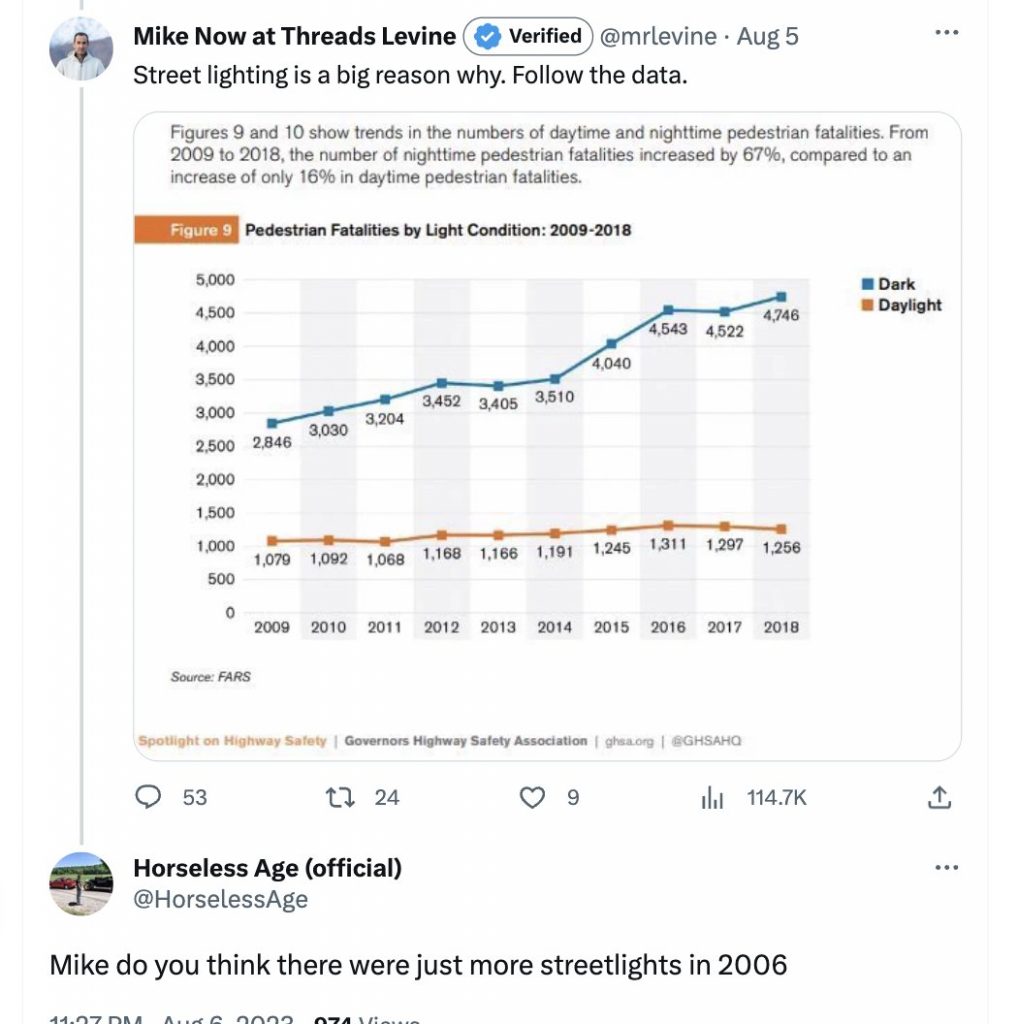
Levine, of course, doesn’t agree, and he immediately ridicules Zipper’s (and others’) points. He says (above) that a lack of street lighting causes pedestrian fatalities. Urbanists recognize this old chestnut– it’s the “but what was she wearing?” of public safety discourse. Victim-blaming. Should you go out and walk down a dark road with black clothing at night? No, probably not. But is it the fault of every pedestrian or victim of other traffic violence if they weren’t wearing hi-viz? Absolutely not, of course. What if we had a better way to explain the increase in traffic fatalities?
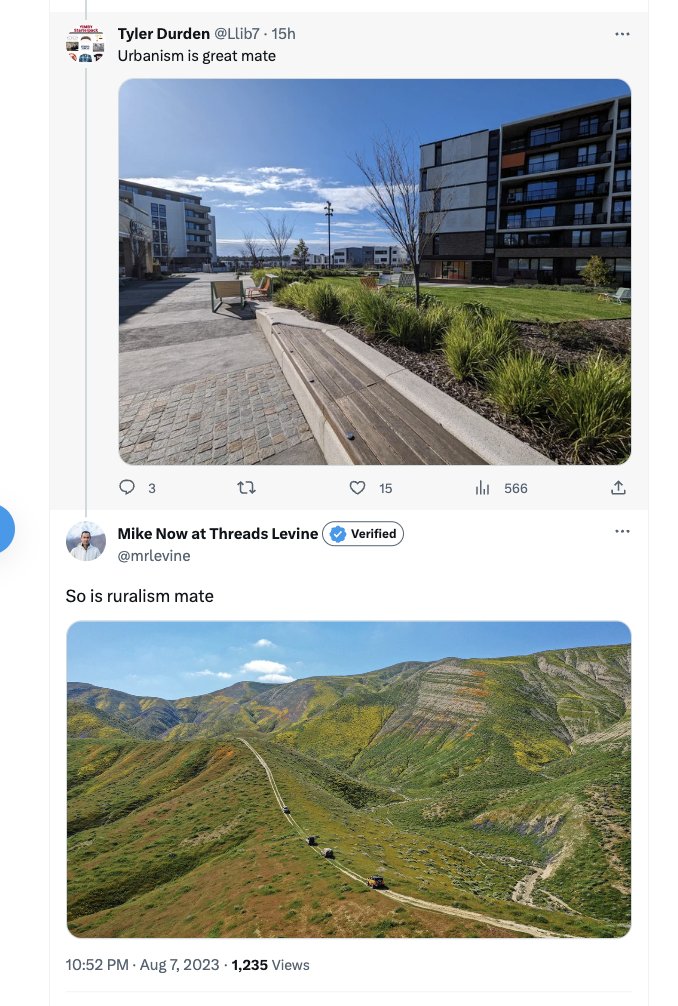
Oh, wait! We do!
But no number of charts or data would compel Mr. Levine, whose main jam here seems to be that he really wants to brag about driving his Maverick to go buy a god damned cup of coffee in Los Angeles. It’s great, he says, because it’s a small vehicle! Levine suggests that the fact that Ford makes a smaller truck that gets better gas mileage is indicative of both the company’s virtue, but also of the incorrectness of the assumptions of Zipper, et alia.
Of course, it doesn’t matter to Levine that the Maverick is sold in tiny numbers compared to the F-series– which outsells the former by a factor of about 30x. Ford also makes a PHEV Escape that my parents drive, love, and routinely gets 60mpg on trips across town. But Ford isn’t promoting the Escape. Nor is it promoting the more fuel-efficient Maverick.
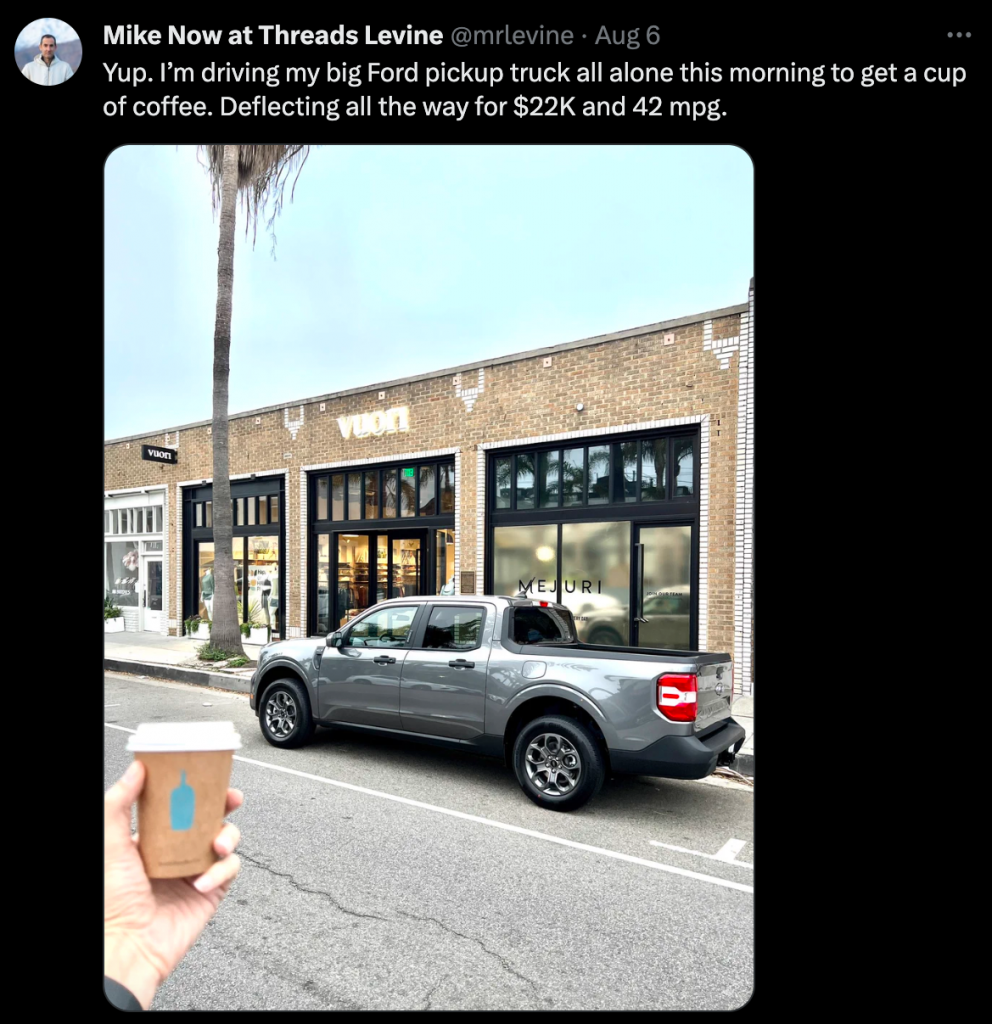
Rather, Levine’s politics– beyond just being a needlessly ornery pissant in what Zipper points out had historically been a relatively civil forum for professional discourse on the subect- feed into the automotive cult of individualism, which I’ve written about in the past. It’s all about me, me, me– me as I drive in my single-occupant vehicle to buy a $7 pourover coffee, me as I emphasize the virtue of my truck (which is marginally smaller than the huge trucks), me as I tell you to piss off. His inclination to dig in on the issue instead of saying, “hey, maybe you have some good points,” even if he didn’t mean it, suggests not only a juvenile, Trumpian disposition, but also just makes his company look bad. Zipper is pointing out an issue with vehicles becoming more lethal, and Levine’s saying, “nuh-uh! Look at this Maverick! 42mpg! Checkmate, libs!” Levine followed up his rant the other day with this post:
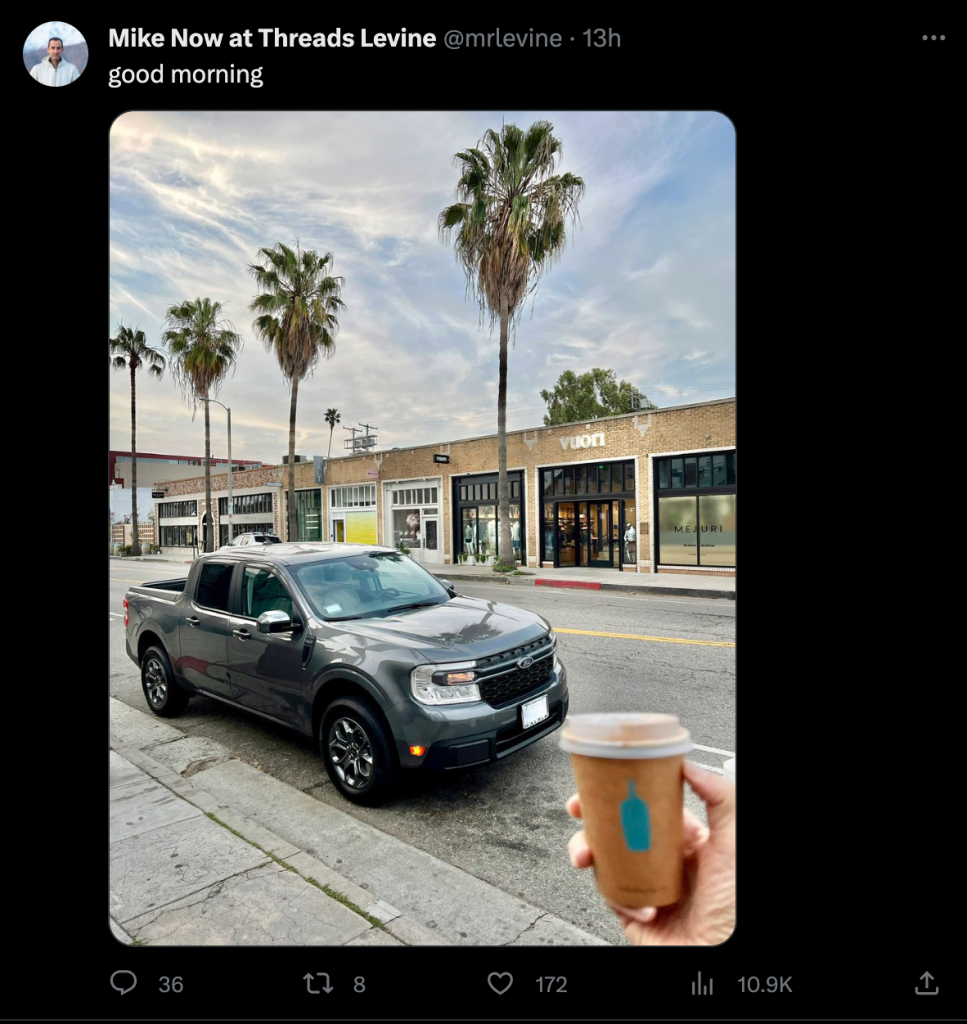
And, finally, with another post, also drinking one of these stupid Blue Bottle coffees, but this time in a Rugged Rural Setting– a setting where, let’s remember, very few truck drivers ever drive their trucks. After all, as he argues– as a Los Angeles resident- ruralism is pretty great! It’s not clear why the man felt the need to dig in so hard, but also to go ham on topics as basic as “we should be able to ride bikes safely” or “it’d be great if fewer people were murdered by drivers on American roads each year,” or, certainly, “maybe we should pay attention to the fact that the high centers of gravity of these vehicles just might have something to do with the increased rates of fatalities in crashes.”
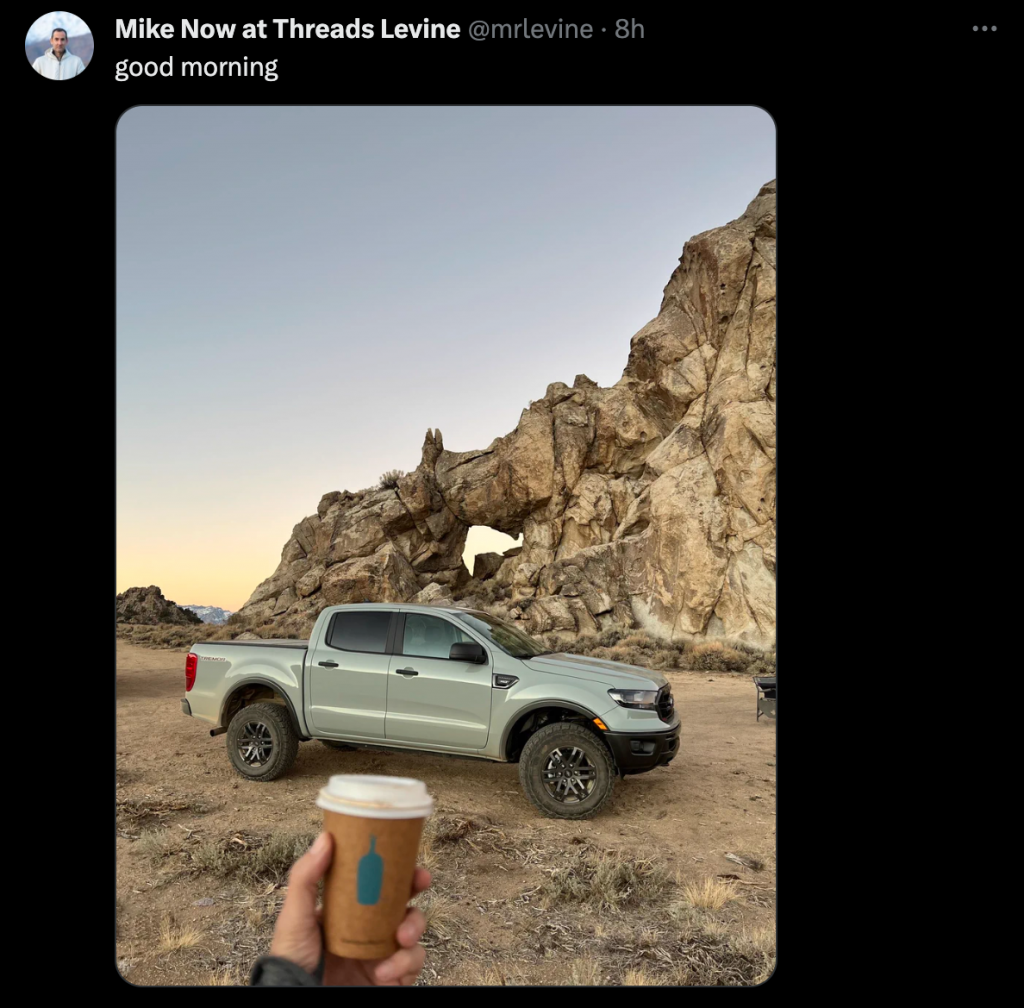
You may note that I do not dole out praise to, nor do I come to the defense of, the members of the Ivy League Extended Universe technocracy terribly easily. The David Zippers of the world are constantly getting the jobs I’m applying for and never hearing back from, and the guy is an Ivy League hat trick to boot, with a Harvard MBA, a planning degree from Cambridge, and a BA from Swarthmore. For the most part, I loathe people like this, because they get the good jobs and are often pretty shitty gatekeepers (Ford City Solutions has a preference for Yale alums, for example– I’ve never even gotten an interview for a job at the company). But credit where credit is due, and take it seriously when I say I’m a fan of the guy and I think he’s doing important work around these questions.
I don’t know what’s up with people like Mr. Levine, except that it’s unusual to see a corporate type being so aggressive in such a public fashion. To an outsider, getting communications out of corporate sector people, in my experience, is rather like pulling teeth, and most of them are frankly pretty weird– they are mostly physically and socially divorced from any communities that I’m part of, so you are never going to run into them around town, they don’t respond to e-mails or phone calls, and they offer cryptic at best communication when they do communicate. This was my experience in the aftermath of the Michigan Central project I worked on, in which zero people have ever communicated with me since I finished thousands of dollars of work (satisfactorily, I assume, because it was featured in the Detroit News and other outlets). This is a brief digression from the topic of “car safety and why corporate executives shouldn’t publicly shit on urbanists trying to improve it,” but it’s worth mentioning because it highlights how a lot of people think about The Other Side.
I am waiting to hear back from Ford’s media team on the matter to see if they have any comments. I assume, given past experience, that they will blow me off since my website’s name doesn’t end in -ew York Times or -etroit Free Press, but who knows? Firsts do happen! After all, it was a first for me to see a director of communications for an F500 company pointlessly trolling some of the leading professional voices on urbanism. Did we learn anything? I certainly learned a bit more about Ford– that perhaps they are more stuck in the single occupant vehicle paradigms and orthodoxy 20th century than they’d like us to believe.


